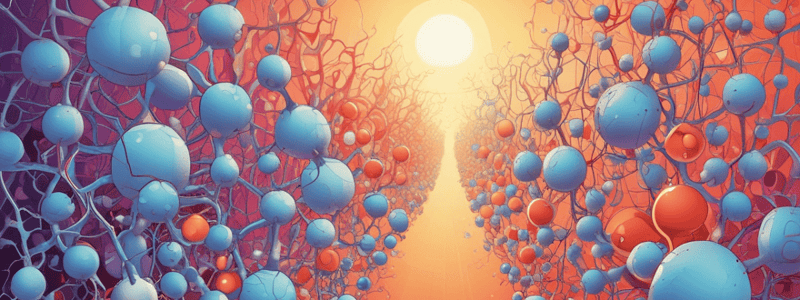Podcast
Questions and Answers
What is the primary function of insulin in relation to glucose?
What is the primary function of insulin in relation to glucose?
- Facilitates glucose entry into the cells (correct)
- Stimulates the production of dietary carbohydrates
- Inhibits glucose absorption in the intestines
- Converts glucose to gluconic acid
Which type of diabetes is characterized by an inability to produce or secrete insulin?
Which type of diabetes is characterized by an inability to produce or secrete insulin?
- Gestational diabetes
- Insulin-dependent diabetes mellitus (IDDM) (correct)
- Non-Insulin-dependent diabetes mellitus (NIDDM)
- Diabetes insipidus
What is the role of glucose oxidase (GOD) in glucose determination?
What is the role of glucose oxidase (GOD) in glucose determination?
- Catalyzes the oxidation of glucose to gluconic acid (correct)
- Catalyzes the conversion of gluconic acid to glucose
- Detects the presence of insulin in blood
- Inhibits the formation of hydrogen peroxide (H2O2)
In the procedure, what is the appropriate wavelength for reading absorbance?
In the procedure, what is the appropriate wavelength for reading absorbance?
What additional component is needed for the reaction of hydrogen peroxide with phenol in the glucose assay?
What additional component is needed for the reaction of hydrogen peroxide with phenol in the glucose assay?
How long should the color formed during the assay be stable for reading absorbance?
How long should the color formed during the assay be stable for reading absorbance?
What is the purpose of adjusting the instrument to zero with a reagent blank?
What is the purpose of adjusting the instrument to zero with a reagent blank?
What does the intensity of the color formed during the glucose reaction indicate?
What does the intensity of the color formed during the glucose reaction indicate?
What is the normal range for blood glucose concentration in plasma/serum?
What is the normal range for blood glucose concentration in plasma/serum?
Which of the following conditions can cause hyperglycemia?
Which of the following conditions can cause hyperglycemia?
What is the formula used to calculate the concentration of glucose in mg/dl?
What is the formula used to calculate the concentration of glucose in mg/dl?
What is the maximum acceptable blood glucose level for a diabetic patient before a meal for tooth extraction?
What is the maximum acceptable blood glucose level for a diabetic patient before a meal for tooth extraction?
How does high blood glucose affect wound healing?
How does high blood glucose affect wound healing?
Which of the following is NOT a cause of hypoglycemia?
Which of the following is NOT a cause of hypoglycemia?
Flashcards are hidden until you start studying
Study Notes
Glucose Overview
- Glucose is a major source of energy for most cells.
- Insulin facilitates glucose entry into cells.
- Diabetes (hyperglycemia) results from an inability of insulin to be produced or secreted.
Types of Diabetes
- Insulin-dependent diabetes mellitus (IDDM)
- Non-Insulin-dependent diabetes mellitus (NIDDM)
- Gestational diabetes
- Diabetes insipidus
Glucose Oxidase (GOD) Principle
- GOD catalyzes the oxidation of glucose to gluconic acid.
- Hydrogen peroxide (H2O2) is detected by a chromogenic oxygen acceptor, phenol, 4-aminophenazone (4-AP) in the presence of peroxidase (POD).
- The intensity of the color formed is proportional to glucose concentration in the sample.
Assay Conditions
- Wavelength: 546nm (490-550)
- Cuvette: 1cm light path
- Temperature: 37ºC or 15-25ºC
- Adjust the instrument to zero with reagent blank
Procedure
- Pipette into a cuvette:
- Blank: 1.0 ml R2
- Standard: 1.0 ml R2, 10 µl standard
- Sample: 1.0 ml R2, 10 µl sample
- Mix and incubate for 10 min at 37ºC or 30 min at room temperature (15-25ºC)
- Read the absorbance (A) of the samples and standard, against the blank
Calculation
- Concentration of glucose (mg/dl) = A Sample / A Standard * 100 (standard conc.)
- 1 mg/dl = 0.0555 mmol/L
Expected Value
- Plasma, serum: 60-110 mg/dl (~ 3.33-6.1 mmol/L)
Clinical Significance
- Causes of hyperglycemia:
- Pancreatitis
- Diabetes mellitus
- Obesity
- Acromegaly
- Hyperthyroidism
- Cushing's syndrome
- Administration of certain drugs
- Causes of hypoglycemia:
- Insulinemia
- Addison's disease
- Galactosemia
- Alcohol ingestion
- Severe liver disease
Dental Treatment
- Maximum acceptable levels of blood glucose for removal of teeth in diabetics:
- 180 mg/dl (before meal)
- 234 mg/dl (2 h after a meal)
- High blood glucose levels reduce nitric oxide secretion, leading to poor circulation and slow-healing sockets.
Studying That Suits You
Use AI to generate personalized quizzes and flashcards to suit your learning preferences.



